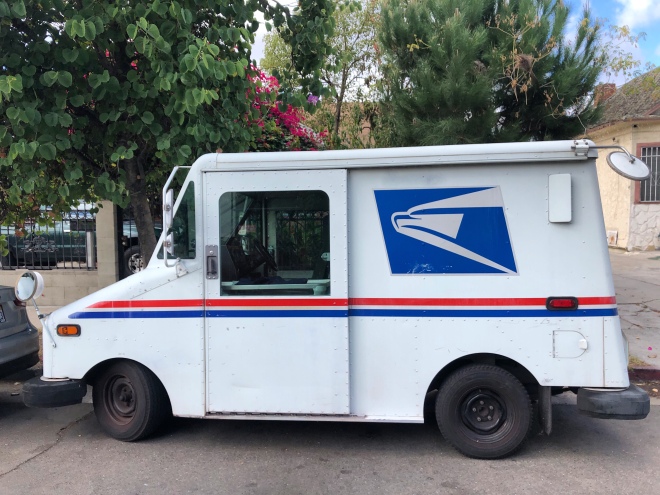Saturday, November 7 it rained in LA in the early hours of the morning. I stepped out later as the sky cleared and the sun was breaking through. This mail van had parked across the street as it does just about everyday.
But that day I felt like taking its picture. To me it’s a symbol that represents the heroes that go unnoticed, whose names we won’t know, whose jobs are usually tedious and not in the least bit glamorous. A public institution seldom celebrated, much less romanticized. But it does work, and like anything worthwhile, it gets better the more we prioritize and invest in it.
More broadly then, it represents those who volunteer to work the polls and register voters, who carefully and laboriously counted every vote this year under extraordinary pressure.
It represents those who stood in line for hours to cast their ballot and boldly defy the pervasive and relentless notion that their voice didn’t matter.
It does matter. And we proved it this year.

No, perhaps the work is not all that glamorous or glorified. But that’s not why we do it.
We do it because it’s necessary, because it amounts to something bigger than any one person. We do it because it makes our community stronger and more inclusive of everyone no matter what they look like, how/if they pray, who they love or who they are.
In America, we’ve long valued individualism typically expressed through personal ambition and prosperity; and while it seems a natural impulse, I’ve come to appreciate how and why service to oneself and to our community must go hand-in-hand. It’s necessary to keep a democracy real.
I am thankful for our public institutions which honor and embody that. I am thankful for our schools, our roads, our libraries, our public transportation, our national parks and public lands, our postal service and (hopefully soon, with more work) our healthcare.
And I am thankful for those who’ve worked hard to keep these institutions strong. Institutions of the people, for the people, and by the people that will–like democracy itself–only grow the more we invest and participate in it.
It’s most definitely worth voting for. I believe it’s worth fighting for and living for.
America, I see you. Let’s get to work.


